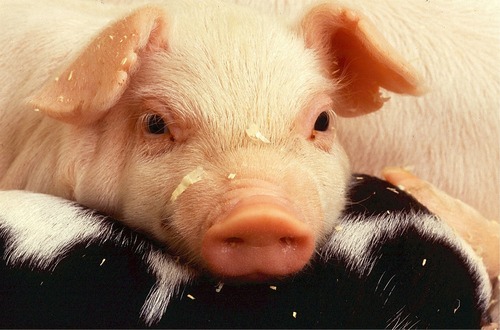Short answer
Yes, pork is bad for you, especially non-organic pork. Swine carry countless diseases.
Recommended Alternative
Long answer
While pork has been eaten for millennia and remains a popular food today, quite a few problems and health risk come along with its consumption. Both Jewish and Islamic religions have long-standing historical prohibitions against the consumption of pork. These prohibitions are no accident. The people groups originated from hot climates, where pigs were the “trash compactors” of their day. Stray pigs would eat anything, including trash, carcasses, and excrements. In this way, pigs picked up diseases and parasites. Upon consumption, the unwanted diseases would be shared with the unlucky person.
People have argued that a modern prohibition against consuming pork does not make sense. They say that since pigs are no longer functioning the same role as in the ancient middle east, that it is now safe to eat them. This is not entirely true, and one has to consider the conditions of modern pig farms. There are many ways in which eating pigs today might be even worse than eating them 2,000 years ago.
A healthy diet for pigs might be table scraps or things like apple cores and pieces of meat. Unfortunately, the cheapest way to feed pigs is by giving them soybeans and legumes, which are very inexpensive by the pound. This type of diet differs greatly from the ideal or natural pig’s diet. Unlike cows, pigs are not ruminant animals, meaning that they cannot easily digest the types of things fed to them. With its ruminant, a cow is able to remove and detoxify the poly-unsaturated fatty acids in the grass, saturating them in a process similar to hydrogenation. In that way, a cow’s tissue fat is going to be more saturated than what it eats. A pig’s fat stores, however, reflect exactly the chemical composition of its diet. If you feed a pig a diet high in soy oil, its tissues will contain that very soy oil. Eating pork can be almost chemically exact to eating soy oil.
As scavengers, pigs typically live in close quarters in a very unhealthy environment. They still eat virtually anything around, including disease-carrying insects, the excrement of other animals, a diseased carcass laying around (such as one of their sick babies that didn't survive), or some unmentionable junk thrown into their food trough or laying around the farm.
To keep pigs alive on an unhealthy diet, the farmers are forced to give them huge numbers of drugs. These drugs, of course, make their way into the human food supply by way of the pig meat. Antibiotics became part of the food supply when they were given in great quantities to pigs by the farmers. When the FDA eventually banned the excessive use of antibiotics in pigs, farmers quickly found ways around the law, for instance by feeding the pigs foods that contain natural antibiotics.
Another thing to consider is the unusual digestive system of a pig. They digest their food very quickly (about 4-6 hours). This does not give them enough time to adequately process and release all the toxins these scavengers pick up. Another area of concern is the lack of sweat glands in swine. This means they are unable to sweat out additional toxins that lie dormant in their bodies. One of the reasons we are recommended to cook pork thoroughly is to kill off worms living in the meat. These worms can lead to a deadly disease called Trichinellosis, which is said to be the cause of Mozart’s premature death at age 35. In addition to Trichinellosis, pigs carry tapeworms, Hepatitis E virus, Porcine Reproductive and Respiratory Syndrome (PRRS), Nipah virus, Menangle virus, flu virus, and much more.
One of the reasons why we are so susceptible to contracting illnesses from pigs is the biological similarities between pigs and humans. Another fact that may sound unusual is that a pig is actually more intelligent than a dog! Actually, the average pig maintains the intellectual capacity of a three-year-old child.
If you know and trust your farmer, occasional pork consumption is fine. However, anything other than locally grown organic pork is an unhealthy option for consumption.
Possible short-term side effects
- tapeworms
- stomach pain
Possible long-term side effects
- trichinellosis
- hepatitus e virus
- porcine reproductive and respiratory syndrome
- nipah virus
- manangue virus
- influenza (flu)

Benefits
- low in calories
Healthier alternatives
- organic grass-fed beef
- organic free-range fowl
Our Wellness Pick (what is this?)
Tex-Mex Jackfruit
- Plant-based alternative
- Rich in fiber
- Soy-free product
- Convenient 10 oz size
- Non-GMO
 Approved by
Approved by 















